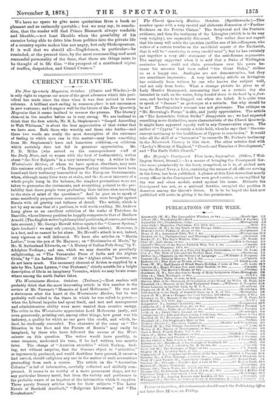The Church Quarterly Review. October. (Spottiswoodo.)—This number opens with a
very careful and elaborate discussion of "Further Evidence on the Petrine Claims." The Scriptural and the Patristic evidence, and then the testimony of the Liturgies (which is in its way very weighty), are separately discussed. The writer does not expect that his essay will settle tbe question (unlike one of his colleagues, who writes of a certain treatise on the sacrificial aspect of the Eucharist, that it will be convincing to every candid mind"), but he has certainly put together a very able statement of the anti-Roman arguments. The analogy suggested when it is said that a Duke of Wellington centuries hence could not claim precedence over his peers be- cause his ancestor had been called "the Great Duke," strikes us as a happy ono. Analogies are not demonstrative, but they are sometimes impressive. A very interesting article on Irvingism has evidently been written by ono who knows the subject well, and not only from books. What a strange picture he gives us of Lady Harriet Drummond, announcing that on a certain day she intended to walk on the water, being handed down to the bank by a foot- man, and having to be dragged out when she failed. It is quite true to speak of " Jeames" as grotesque at a miracle. But why should he be so ? The Centurion's servant was not grotesque. The critique on "Mr. Browning's Poems" is able, and justly appreciative. The article on "The Lancashire Cotton Strike" disappoints us ; we had expected something more distinctive, more characteristic of the Church Quarterly. It might have appeared equally well in any Conservative organ. The author of " Cyprus " is surely a trifle bold, when he says that "the con- current testimony to the healthiness of Cyprus is conclusive." It would take all the skill of a " harmonist" to reconcile Mr. Forbes's testimony in the Nineteenth Centtay to this view. The other articles deal with " Lecky's History of England," Creeds and Theories of Development," and "The Early Celtic Church."


































 Previous page
Previous page